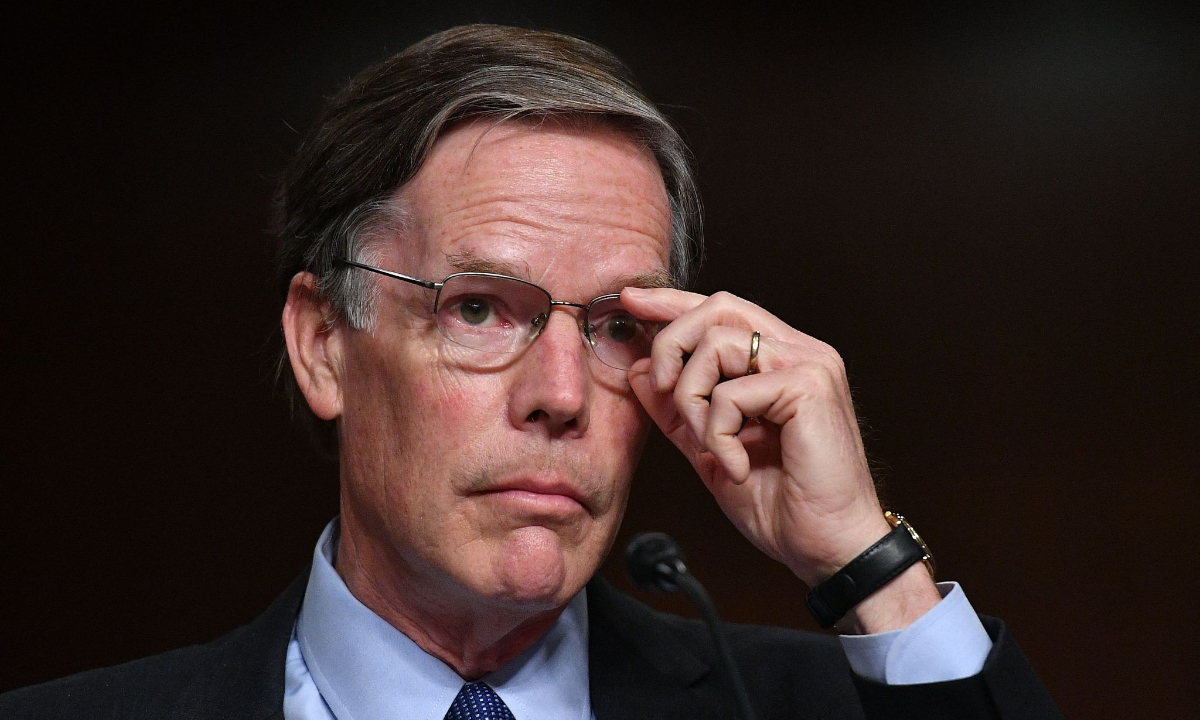
Nicholas Burns Photo:VCG
US Ambassador to China Nicholas Burns said some true words in an interview on the latest episode of the CBS program "60 Minutes." Referring to "some people" who say the economic relationship with China should be ended, Burns said, "The consequence of that would be 750,000 American families wouldn't be able to put dinner on the table." In context, Burns was referring to some people in the US. The trade relationship between China and the US is one of the most important bilateral trade relations in the global economy, and once "decoupled," the figure "750,000" that Burns mentioned is still a minimum. In recent years, we have heard very little of such frankness, although still reserved, in the US political arena. It is a microcosm of the distorted environment of US public opinion on China that its occurrence even once can make it to the top of the trending news.
Compared with the previous smears against China, Burns' remarks this time are quite objective. Of course, we cannot rule out the possibility that Burns, as the current US ambassador to China, is using this interview as a microphone to publicize the Joe Biden administration's policy achievements, intending to make domestic voters agree that the Biden administration's series of strategy on China is in the US' interest and push back against the more radical voices of China hawks. This is because although Burns has demonstrated his awareness of the complexity and risks of the China-US relationship on the surface, his discourse has always centered on how to "manage" the relationship with China under the US-led framework, rather than seeking to build a more just and reasonable, mutually beneficial and win-win international order from a global perspective. Therefore, his words need to be viewed dialectically.
In fact, the US has not changed its positioning of China as a "strategic competitor," nor has it changed its actions to "invest, align, and compete" regarding China. This can be seen in Burns' remarks in the CBS interview that China wants to "become and overtake the US as the dominant country globally" and the two countries' militaries are "vying for military supremacy." It needs to be said that China's economic development, scientific and technological progress and its desire to play a greater role in global affairs are labeled as the pursuit of global hegemony, which not only distorts the truth but also exposes the nature of Washington's own hegemonic thinking. It is not surprising that US public opinion, dominated by this kind of thinking, hypes the "China peak" theory at one time and the "China threat" at another.
In addition to Burns' remarks, CBS discovered an interesting phenomenon during its Beijing trip. According to the CBS report, the program team "requested interviews with many American firms that do business in China, but the majority would not speak to 60 Minutes, even off the record." One significant reason is the concern about reactions in the US, including from members of Congress looking for tougher policy on China. What kind of unfavorable atmosphere toward China has led to such a cautious approach by American enterprises in China? The answer is self-evident. If Burns truly wants China and the US to "live together," achieving the maximization of mutual interests, the immediate priority is to rectify Washington's own attitude toward China.
Burns has been the US ambassador to China for almost two years. He took on this position during a one-year and five-month vacancy of the role, at a time he described as the "lowest moment since 1972" in China-US relations. It can be said that he assumed the position "in a time of crisis." Over the past two years, using a common Chinese saying, Burns has not planted many flowers but has planted quite a few thorns. His overall performance aligns closely with Washington's attitude and actions toward China, lacking the proactive space that the critical position of "ambassador to China" in bilateral relations should entail. For Burns, who has a "professional and rational" reputation in the US, this may be considered a regret in his career. Will Burns make up for this regret in the remaining term? There are still expectations from the outside world.
Over these two years, Burns has visited many places in China, engaging with various sectors of Chinese society. His understanding of the true situation in China is undoubtedly much deeper than that of most politicians in Washington. Burns has a responsibility to translate this understanding into positive energy to propel China-US relations back onto a healthy track, speaking more truths about the bilateral relationship. The murky atmosphere in US public opinion on China needs to be clarified. Burns has said more than once that China and the US must achieve peaceful coexistence, which is also China's stance. Hopefully, Burns and other members of influential US political elite will make their due contribution to this common goal.

